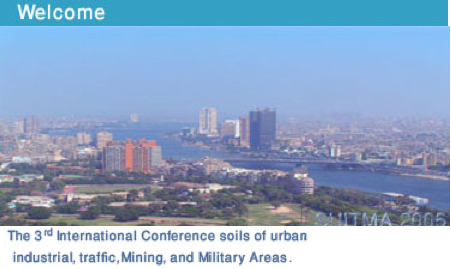SUITMA 2005 Cairo Content
Back to the SUITMA symposium
|

Such problems were recognized by the Working Group on SUITMA of the International Union of Soil Sciences. An objective was to define appropriate procedures to survey, analyze, manage, and utilize soils of the urban, industrial, traffic, mining, and military areas. Additional work is needed to modify/devise procedures seeking compatibility with unconventional soils. A new research frontier was recognized by the soil scientists who met twice in the past few years, SUITMA 2000 in Essen Germany and SUITMA 2003 in Nancy France. In Cairo 2005, we promise to create the enabling environment to generate more knowledge and facilitate information exchange. In this context, we need your participation to enrich our collective ability to learn new aspects of soil science. Furthermore, we need your participation to prove that we soil scientists can extend mutual understanding between cultures and enhance human tolerance. |
